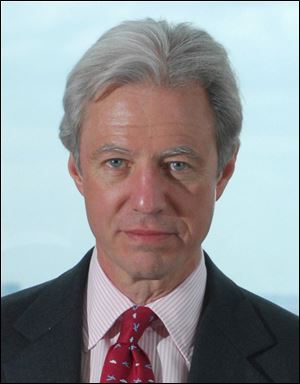
Barclays Chairman Agius steps down amid rate-fixing scandal
CEO Diamond still under pressure
7/2/2012
Chairman of United Kingdom-based Barclays bank Marcus Agius in London.
LONDON — The chairman of Barclays bank announced his resignation Monday, accepting responsibility for a rate-fixing scandal and leaving the chief executive to face growing demands that he step down, too.
Last week, U.S. and British hit Barclays with fines totaling $453 million for submitting false data on interbank borrowing rates between 2005 and 2009.
Rather than satisfy calls for accountability at Barclays, the resignation of Chairman Marcus Agius saw politicians step up their calls for CEO Bob Diamond to go as well.
“Everybody is asking when are the other senior people at the top of Barclays going to take responsibility for the things that happened on their watch,” Deputy Prime Minister Nick Clegg said.
Ed Miliband, leader of the opposition Labour Party, also called for Diamond to step down.
Barclays shares were 3.8 percent higher in midday trading at 169 pence, regaining some of the ground lost after the fines were announced on Wednesday.
Barclays is one of a number of banks which regularly submit estimates of what it will cost them to borrow from other banks. These estimates feed into calculation of the London interbank offered rate (LIBOR) which is used to determine payments from a range of derivatives contracts.
The London rate, and the related European interbank offered rate, are the benchmarks for over $500 trillion in global contracts, including loans and mortgages.
Barclays admitted that it had submitted lower than actual figures on its interbank borrowing during the credit crisis in 2007 and 2008. Several other global banks are being investigated in several countries for similar actions.
Agius’ position was particularly sensitive as he was also chairman of the British Bankers’ Association, the trade body that collects the banks’ rate submissions to calculate the LIBOR.
“As chairman, I am the ultimate guardian of the bank’s reputation,” said Agius, who has led Barclays’ board since 2007. “Accordingly, the buck stops with me and I must acknowledge responsibility by standing aside.”
In a further attempt to soothe critics, Agius said Michael Rake, a senior independent director of the bank, has been appointed to lead an in-house review of all past practices and to publish a report of its findings and develop a new, mandatory code of conduct for everyone at Barclays.
Agius will remain as chairman until a successor is appointed, the bank said.
He was paid 751,000 pounds (1.18 million) by Barclays in 2011, but his final payoff was not immediately announced.
Rather than take the heat off Diamond, Agius’ departure may leave the CEO more exposed.
Diamond is likely to face a grilling Wednesday when he appears before a group of lawmakers. His critics say he is culpable because he set the aggressive style at Barclays Capital, the investment banking operation he previously led.
He has said the actions by Barclays and its traders were wrong, but offered no suggestion he might leave his post.
“Even taking account of the abnormal market conditions at the height of the financial crisis, and that the motivation was to protect the bank, I accept that the decision to lower submissions was wrong,” Diamond said last week in a letter to Andrew Tyrie, chairman of the House of Commons Treasury Committee.
In other cases, regulators found that individual Barclays traders encouraged colleagues to file false reports to protect their own dealings.
Among other banks being investigated, Royal Bank of Scotland —82 percent owned by British taxpayers — declined to comment Monday on reports it had fired three traders in London and one in Singapore last year because of interest rate manipulation.
“RBS Group continues to cooperate with the investigations and liaise with the relevant regulators,” the bank said.
Agius, 65, joined the Barclays board in 2006 and became chairman in January 2007.
His banking career began when he joined Lazard, a major asset management and advisory company, in 1972. He served as chairman of Lazard London and then as deputy chairman of the company’s worldwide operations.
“If anything, by falling on his own sword, Mr. Agius leaves the board temporarily weakened at a time when a strong leader is required to make tough decisions,” said Gary Greenwood, analyst at Shore Capital.
“While the departure of Mr. Agius will grab the headlines today, the bigger issue remains whether Mr. Diamond should also remain in his role,” Greenwood added. “From a pure operational perspective it is not clear to us that his removal would be beneficial, but we question whether the negative sentiment towards the company, of which he is the focus, can be repaired while he remains at the helm.”